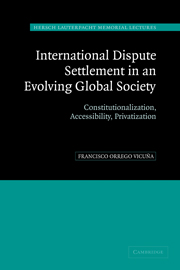 International Dispute Settlement in an Evolving Global Society
International Dispute Settlement in an Evolving Global Society Book contents
- Frontmatter
- Contents
- Preface
- Acknowledgements
- List of abbreviations
- Table of treaties
- Table of cases
- 1 An evolving international society: institutionalization, privatization, globalization
- 2 A constitutional court for an international society?
- 3 Individuals and settlement of international claims: change and adaptation of governing rules
- 4 Individuals before international courts and tribunals: a continuing progression
- 5 Shaping a new role for the individual in international dispute settlement: the contribution of specialized jurisdictions
- 6 The World Trade Organization integrated dispute settlement system: innovation and transition
- 7 An alternative dispute resolution system for international disputes
- 8 A centralized-decentralized dispute resolution system for the international community?
- Bibliography
- Index
8 - A centralized-decentralized dispute resolution system for the international community?
Published online by Cambridge University Press: 04 August 2010
- Frontmatter
- Contents
- Preface
- Acknowledgements
- List of abbreviations
- Table of treaties
- Table of cases
- 1 An evolving international society: institutionalization, privatization, globalization
- 2 A constitutional court for an international society?
- 3 Individuals and settlement of international claims: change and adaptation of governing rules
- 4 Individuals before international courts and tribunals: a continuing progression
- 5 Shaping a new role for the individual in international dispute settlement: the contribution of specialized jurisdictions
- 6 The World Trade Organization integrated dispute settlement system: innovation and transition
- 7 An alternative dispute resolution system for international disputes
- 8 A centralized-decentralized dispute resolution system for the international community?
- Bibliography
- Index
Summary
The basic tenet underlying the discussion in the prior chapters is that as international society moves towards centralization, at the same time it includes increasingly decentralized activities and a multiplicity of actors and subjects. Therefore, the dispute resolution system devised by such society must make available both centralized and decentralized mechanisms for attending to the social needs of this evolving structure.
As has been indicated, this dual centralized-decentralized track might appear contradictory but this is only at first sight. All societies, particularly modern ones, have developed both a central function, mostly related to the conduct of governments, and a decentralized structure, where citizens might pursue their activities with as little interference as possible from the government or the state. In fact, the most important aspect of current social evolution is how to overcome the all-encompassing and intruding role of governments that flows from the past traditions of autocratic or authoritarian rule. To the extent that this is achieved a command-free society emerges, allowing for individuals to develop their own interests and initiative, subject only to common rules of social conduct. It is in this framework that democracy has flourished as a paradigm of contemporary social arrangements.
In essence, international society is not different from modern social structures as it ultimately is concerned with providing its subjects with a better and more effective form of government. The subjects, of course, include a more varied spectrum of entities, including states and governments themselves, international organizations, individuals and corporations.
- Type
- Chapter
- Information
- International Dispute Settlement in an Evolving Global SocietyConstitutionalization, Accessibility, Privatization, pp. 124 - 126Publisher: Cambridge University PressPrint publication year: 2004
